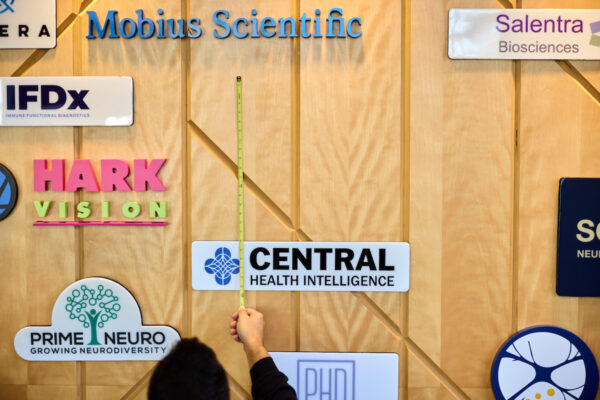When you think of mindfulness, a personal practice of deep breathing, meditation or pausing for reflection might come to mind. Expanding its use beyond the individual benefit to the collective to achieve systemic change and organizational equity is the focus of a prestigious National Science Foundation grant recently awarded to Washington University in St. Louis.
The university will receive a $3 million five-year National Science Foundation (NSF) ADVANCE-Institutional Transformation grant designed to address systemic barriers to intersectional gender and racial or ethnic equity for faculty in STEM (science, tech, engineering and math) fields. The programs funded through this highly competitive grant called AIM (Activating Intersectionality through civic Mindfulness) for Equity will launch several academic leader and faculty-focused initiatives, including the AIM Center for Faculty Equity. AIM for Equity’s new conceptualization of civic mindfulness is the innovation to driving organizational change at WashU, said Kia Caldwell, vice provost for faculty affairs and diversity and lead principal investigator of the grant. The impact of this grant is institutionwide as it will actively engage faculty and leaders in seven of WashU’s nine schools.
The NSF recognizes that systemic inequities may exist in areas such as policy and practice for women STEM researchers, particularly for those from historically racially/ethnically underrepresented groups. Those inequities may impede research productivity, delay advancement, create a culture of differential treatment and rewards, and impact well-being. The aim of NSF ADVANCE grants is to make faculty leadership more aware of these issues and create policies and processes that foster equity so they can work to create systemic changes that lead toward true transformation.
“A key component of WashU’s strategic plan is focusing on our people and supporting them with their academic, professional and life goals,” said Beverly Wendland, WashU provost and executive vice chancellor for academic affairs. “The Aim Center for Faculty Equity and its associated programs are a prime example of that commitment in motion. I’m proud of the effort we’ve made so far to support everyone in our community, and I look forward to the positive changes that will come as a result of this funding.”
“With this particular grant mechanism, you have to propose something that is innovative to higher education,” Caldwell said. “The bar is high, and this new conceptualization of mindfulness will offer a curriculum that’s tailored to faculty with the aim of developing a systemic method to address inequities among STEM faculty members, as well as in other fields.”
“The benefactors are women faculty and especially racially/ethnically minoritized women faculty in STEM disciplines,” said Aurora Kamimura, assistant provost for inclusive excellence and Co-PI of the grant. “However, the work that will transpire will be for faculty and academic leaders in all disciplines. It’s about not burdening the community it’s intending to impact, but instead changing the environment and climate in which these individuals work. That’s the transformative piece.”
Mindfulness isn’t new to WashU. Since 2020, the Mindfulness Science and Practice cluster has brought together a diverse set of researchers, scholars and mindfulness practitioners focused on universitywide initiatives and goals.
The AIM for Equity grant, broadly, draws upon the expertise of the Mindfulness Science and Practice cluster in its novel approach. The Co-PIs also are working with internationally recognized mindfulness and leadership expert Michael Chaskalson to develop the leadership institute and curriculum, which will be offered to department chairs/heads and vice deans across campus. The AIM Center for Faculty Equity will be the resource hub and gathering site for faculty and leaders to engage with this work.
While the civic mindfulness approach will embrace some of the traditional aspects of thr practice — taking the time to pause, being thoughtful and active reflection — it will also center on the concepts of reciprocity, collective responsibility, cultural humility and anti-racism.
“To our knowledge, this will be the very first effort at a higher education institution in which mindfulness is specifically used and geared toward increasing STEM equity at a systemic level,” said Diana Parra Perez, an assistant professor at the Brown School, a co-PI on the grant and co-lead of WashU’s Mindfulness Science and Practice cluster. “In that sense, it is truly an innovation that an organization such as the NSF sees enough rigor and scientific merit to invest in this work and to believe in the potential and the power of mindfulness, awareness and care to create collective responsibility.”
The AIM for Equity grant team will offer programming, dialogue opportunities and a curriculum, including in-person and virtual events, beginning next fall. Support for equitable faculty policies and enhanced work-life balance for faculty also will be key components of the grant.
More information about the AIM for Equity grant is available on the initiative’s webpage.


